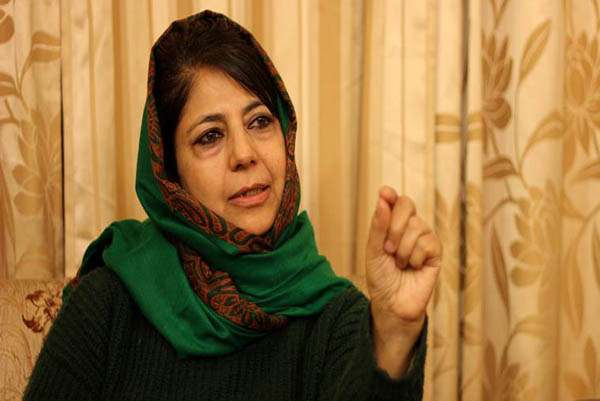Srinagar, October 15:
The release of Peoples Democratic Party (PDP) president Mehbooba Mufti from more than 14 months of detention appears to have galvanised political parties of Jammu and Kashmir, where all mainstream groups will meet on Thursday to take stock of the situation in the erstwhile state and decide on their next course of action.
A day after her release, National Conference leaders Farooq Abdullah and Omar Abdullah on Wednesday visited Mufti’s residence and invited her to the meeting. Mufti, who like the Abdullahs is a former chief minister of J&K, accepted the invitation.
Mufti, and other major politicians of J&K including the Abdullahs, were detained ahead of the Constitutional changes pushed through by Parliament on August 5, 2019, nullifying Article 370 of the Constitution to divest the state of its special status and reorganising it into two Union territories — J&K and Ladakh. Farooq and his son Omar Abdullah were released in March.
“My father and I called on Mehbooba Mufti Sahiba this afternoon to enquire about her well-being after her release from detention. She has kindly accepted Farooq Saab’s invitation to join a meeting of the Gupkar Declaration signatories’ tomorrow (Thursday) afternoon,” Omar Abdullah said.
“Today, our visit was without any political motive and we wanted to know her well-being… In the meeting tomorrow, the present political situation will be reviewed and what will be the future agenda of the Gupkar Declaration signatories in one view, that will also be discussed,” he said.
Gupkar Declaration is a joint initiative of all the regional mainstream political parties – the National Conference, the Peoples Democratic Party,the People’s Conference, the Awami National Conference and the Communist Party of India (Marxist) – of J&K.
On August 4, 2019, a day before the revocation of Jammu and Kashmir’s special status, a group of prominent politicians of J&K met in Srinagar at Gupkar and issued a joint statement vowing to defend the “identity, autonomy and special status of Jammu & Kashmir against all attacks and onslaughts whatsoever”. The statement has since come to be known as the Gupkar Declaration.
After the meeting with the Abdullah, Mufti said she was hopeful that together they could change things.
“It was nice of you & Farooq sahab to come home. It gave me courage listening to him. I am sure together we all can change things for the better,” Mufti said in response to Omar Abdullah’s comments.
Mufti sent a terse message to Delhi just an hour after her release from detention.
“I have become free today after more than a year. During this time the black decision of August 5, 2019, black day, would always pain my heart and soul. And I realize that the people of J&K would have the same feeling. Nobody among us can forget the day’s robbery and humiliation,” she said in a 1.23 minute long audio message.
“Now we all will have to reiterate that whatever Delhi Darbar, unconstitutionally and undemocratically, snatched away from us will have to be taken back,” said Mufti, who spent Wednesday meeting leaders and workers of her party who came to visit her from all over the Kashmir valley.
More than a year after the constitutional changes related to J&K, on August 22, 2020, the six signatories again issued a statement and announced that they would carry forward the Gupkar Declaration.
It was the first such joint statement signed by mainstream parties after the revocation of Article 370 and the bifurcation of the region into two union territories; it hinted at a joint campaign for the restoration of Jammu and Kashmir’s special status.
“We all reiterate that we are bound, wholly, by the contents of the Gupkar declaration and will unwaveringly adhere to it. We are committed to strive for the restoration of Articles 370 and 35A, the Constitution ofJ&K and the restoration of the State and any division of the State is unacceptable to us. We unanimously reiterate that there can be ‘nothing about us without us’,” the joint statement said.
Article 35A empowered the Jammu and Kashmir legislature to define the permanent residents of the state and provide them special benefits and privileges.




